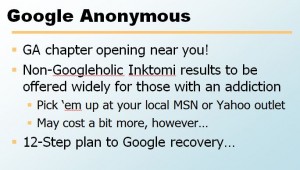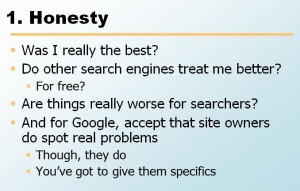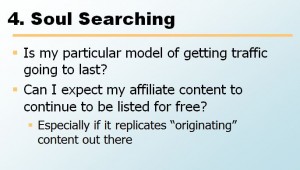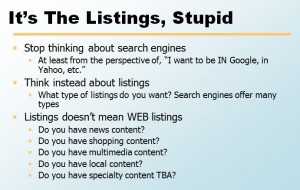SEO Remains A Viable Marketing Strategy For Anyone
Ah, another SEO is dead post from a non-SEO to get the blood rushing on an otherwise calm weekend. I’ve been ignoring these more and more lately, but in the wake of Google’s Farmer Update, it looks like everyone could use some history lessons. Don’t depend solely on SEO, but don’t neglect it, either. SEO […]
 Ah, another SEO is dead post from a non-SEO to get the blood rushing on an otherwise calm weekend. I’ve been ignoring these more and more lately, but in the wake of Google’s Farmer Update, it looks like everyone could use some history lessons. Don’t depend solely on SEO, but don’t neglect it, either.
Ah, another SEO is dead post from a non-SEO to get the blood rushing on an otherwise calm weekend. I’ve been ignoring these more and more lately, but in the wake of Google’s Farmer Update, it looks like everyone could use some history lessons. Don’t depend solely on SEO, but don’t neglect it, either.
SEO Is Not The Only Way
Let me quote someone I know really well, some sage words about SEO, from 1996. That’s 15 years ago, from before anyone was even saying “search engine optimization” widely.
This person had written one of the first guides on how webmasters and site owners should ensure their content was friendly to both search engines and human beings:
Search engines are a primary way people look for web sites, but they are not the only way.
People also find sites through word-of-mouth, traditional advertising, the traditional media, newsgroup postings, web directories and links from other sites. Many times, these alternative forms are far more effective draws than are search engines. The audience you want may be visiting to a site that you can partner with, or reading a magazine that you’ve never informed of your site.
Do the simple things to best make your site relevant to search engines, then concentrate on the other areas.
That was me, in my very first edition of “A Webmaster’s Guide To Search Engines” (see one of the archives here), which grew into the career of writing about search, SEO and search marketing that I’ve continued on today.
The Cycle Of Overdependency

The slides I’m scattering around as illustrations to this post? From a keynote talk I gave in 2003, after Google’s Florida Update swept across the web, raising concerns. But I guess there’s always a new generation that needs reminding.
The traffic that some sites have lost in the wake of Google’s Farmer Update (also called Panda) is not a new thing in general. Google has made major changes to its algorithm many times before that has caused some to lose traffic. And before Google (yes, there was a before Google), players like Excite and Infoseek and Lycos and AltaVista would make changes that cause some sites to lose traffic and wonder how they’d stay in business.
Is SEO Dead?

Just start-ups? Because why? Because only start-ups have “small teams, small budgets, and the scruples to avoid black-hat tactics” that can’t compete with established companies which apparently have big teams, big budgets and no scruples that let them win?
SEO Continues To Work For Big & Small

I gather in the start-up world, perhaps SEO was seen as some type of super-juice that could jump-start a new business. It should have never been seen that way, any more than ANY NEW business or ANY business at all should have relied on it so much. It should have been part of an overall marketing mix — not the primary marketing means.
The Social Slice

Some sites these days report they get more traffic from social than from search. That’s great! But the same risk applies — if you’re depending on social as your primary marketing channel, you’re depending on a medium over which you can’t directly control. Factors outside your influence could bring a crash. Do don’t put all your eggs in the social basket, any more than you would in the search basket. Be diverse.
Link Authority Is Dated, But Still

Maybe it will improve as Google continues to add more signals into the mix, like social. But even now, pick a month, and 20% to 40% of our visits come from search. That’s a lot of visits.
Good SEO & Good Content Works
SEO doesn’t work for quality content? We’ve got quality content out of our ears here, and we get thousands of visitors per day coming in from search. It’s not black hat SEO that’s doing it, nor a link scheming, nor having a domain that dates back to when Tim Berners-Lee first walked across the web. It’s still the things that anyone should be doing. Is your site accessible to search engines? Are you paying attention to your title tags? Are you thinking about the copy you write? And most of all — do you have good content?
If you’re a start-up, do take Dixon’s advice not to expect that SEO will propel you to IPO heaven on a rush of traffic. Let’s face it — for a lot of start-ups, nothing is going to do that, because you’re pitching a new, unproven product that might not be the awesomesauce you believe.
But don’t ignore SEO. That’s just crazy. If you really don’t want the free traffic it provides, then please — put up a robots.txt file blocking search engines from your site. Leave room for the rest of us.
More About SEO
For more about SEO and why it’s useful to anyone, see these posts below:
- What Is SEO / Search Engine Optimization?
- Some SEO Advice For Bill Gates
- 29 Worst Practices & Most Common Failures: SEO Checklist, Part 1
- SEO Checklist Part 2: Best Practices
- 36 SEO Myths That Won’t Die But Need To
- 36 More SEO Myths That Won’t Die But Need To
- 21 Essential SEO Tips & Techniques
- Is SEO Dead? 1997 Prediction, Meet 2009 Reality
- SEO Is Here To Stay, It Will Never Die
- Thoughts On Web Developers, SEO & Reputation Problems
More About The Farmer Update
For more about Google’s most recent update, see these posts below:
- Google Forecloses On Content Farms With “Farmer” Algorithm Update
- Google Speaks More About The Farmer Update, AKA Panda Update
- Number Crunchers: Who Lost In Google’s “Farmer” Algorithm Change?
- More Farmer Update Winners, Losers: Wikihow, Blippr & Yahoo Answers
- Your Site’s Traffic Has Plummeted Since Google’s Farmer/Panda Update. Now What?
And hey, next week is our SMX West search marketing conference in San Jose. Come on by — I’ve got an entire keynote I’ve been working on that touches on some of these issue and the major “searchquake” that we’ve been going through in the past few months.
Contributing authors are invited to create content for Search Engine Land and are chosen for their expertise and contribution to the search community. Our contributors work under the oversight of the editorial staff and contributions are checked for quality and relevance to our readers. The opinions they express are their own.
Related stories
New on Search Engine Land